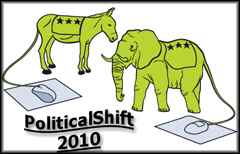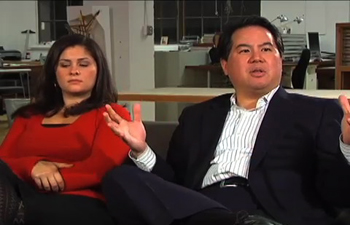5Across is sponsored by Carnegie-Knight News21, an alliance of 12 journalism schools in which top students tell complex stories in inventive ways. See tips for spurring innovation and digital learning at Learn.News21.com.
As more people use social media such as Twitter and Facebook, politicians and campaigns need to put more time, energy and money into reaching people there. According to the E-Voter Institute, 80% of people who are avid social network users consider themselves to be occasionally or very active in politics. And 34% of them rely on social networks for general information, up from 29% last year. (You can get more statistics and data on social networking use and politics in this great MediaShift report from Anthony Calabrese.)

So for this month’s episode of 5Across, I brought together people involved in politics and social media, looking at it from many angles. A local San Francisco politician, Phil Ting, discussed what he calls “user-generated government” and how online discussions can help shape policy. We also talked about the importance of being authentic on social media, and we questioned why campaigns continue to spend billions of dollars on TV ads while barely spending anything online. Finally, we discussed the exciting advent of open data from local and federal governments in the U.S., and the rise of mobile apps in campaigning — and even fixing potholes. Check it out!
5Across: Politics + Social Media
Guest Biographies
Ngaio Bealum describes himself on Twitter as “a comedian, magazine publisher, juggler, musician, parent, activist, Sacramentan, and a great cook. I also like hard beats and soft drugs.” Bealum has been actively supporting the California initiative, Proposition 19, to legalize marijuana in the state.
Marisa Lagos covers state politics and government for the San Francisco Chronicle, including elections, the legislature and issues such as prisons and welfare. Over the past year her coverage has ranged from stories on the attorney general race and budget crisis to sex offender laws and legislation aimed at making sure consumers know whether they are wearing faux fur or raccoon dog (seriously). Previously, she worked at the Los Angeles Times and SF Examiner. She has written exclusively for the web, blogged and used social media to promote her work.
As communications and media director, Mary Rickles spends her days writing about Netroots Nation and getting others to do the same. She has a unique background in both traditional and new media, having worked as a reporter and with campaigns, agencies, non-profits and corporate companies on projects ranging from brand development to community outreach. She previously was communications director for the grassroots powerhouse Democracy for America and in 2009 was named one of New Leaders Council’s Top 40 Under 40 Emerging Leaders. Mary grew up in Birmingham, Ala., where she got her first taste of politics by volunteering for Don Siegelman’s gubernatorial campaign.
As Assessor-Recorder of San Francisco, Phil Ting is a reformer whose efforts have enabled him to generate over $245 million in new revenue for San Francisco.
Ting began his career as a real estate financial advisor, working at Arthur Andersen and CB Richard Ellis. Prior to serving as the Assessor-Recorder, Ting also had a long history of civil rights advocacy — he was the executive director of the Asian Law Caucus. He is past president of the Bay Area Assessors Association and has served on the board of Equality California Institute.
Theo Yedinsky started Social Stream Consulting, a social media and political strategy firm and is a partner in the Oakland-based social media firm, North Social. In 2009, Theo Yedinsky served as the new media director for San Francisco Mayor Gavin Newsom’s campaign for Governor of California. At the time, Mayor Newsom’s campaign boasted the largest Facebook and Twitter following for a non-presidential Democratic candidate in the country. Prior to joining the Newsom campaign, Theo served as the first executive director of the New Politics Institute, a think-tank designed to study the increasing impact of technology and new media in political campaigns. Prior to launching the New Politics Institute, he managed Simon Rosenberg’s campaign to become chairman of the Democratic National Committee and worked extensively on Senator Kerry’s campaign for President.
If you’d prefer to watch sections of the show rather than the entire show, I’ve broken them down by topic below.
User-Generated Government
Authenticity Online
The Power of Facebook
Buying Ads Online
Open Data and Mobile Apps
Credits
Mark Glaser, executive producer and host
Corbin Hiar, research assistant
Jason Blalock, camera
Julie Caine, audio
Location: Vega Project & Kennerly Architecture office space in San Francisco
Special thanks to: PBS and the Knight Foundation
Music by AJ the DJ
*****
What do you think? Which politicians are doing the best job of utilizing social media? Which mobile apps are helping you get local information? Share your thoughts in the comments below.
Mark Glaser is executive editor of MediaShift and Idea Lab. He also writes the bi-weekly OPA Intelligence Report email newsletter for the Online Publishers Association. He lives in San Francisco with his son Julian. You can follow him on Twitter @mediatwit.
5Across is sponsored by Carnegie-Knight News21, an alliance of 12 journalism schools in which top students tell complex stories in inventive ways. See tips for spurring innovation and digital learning at Learn.News21.com.

